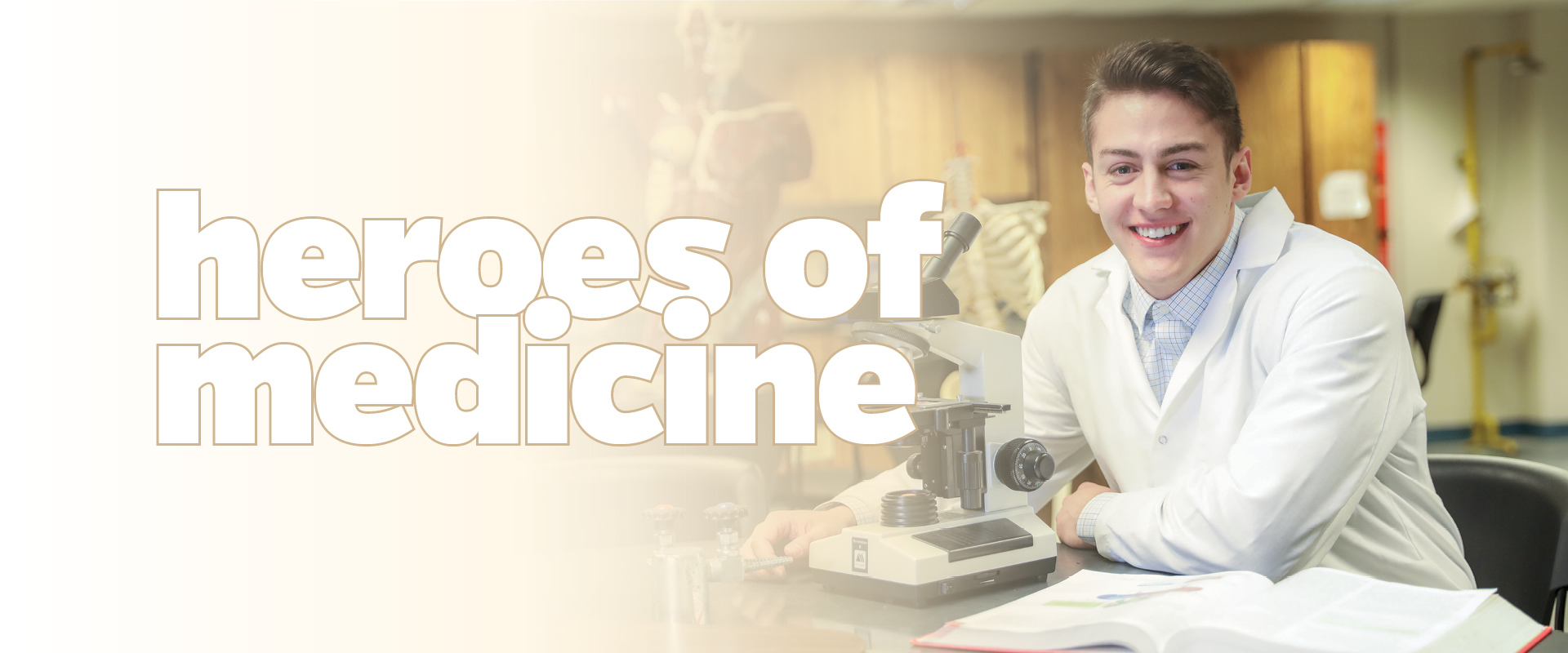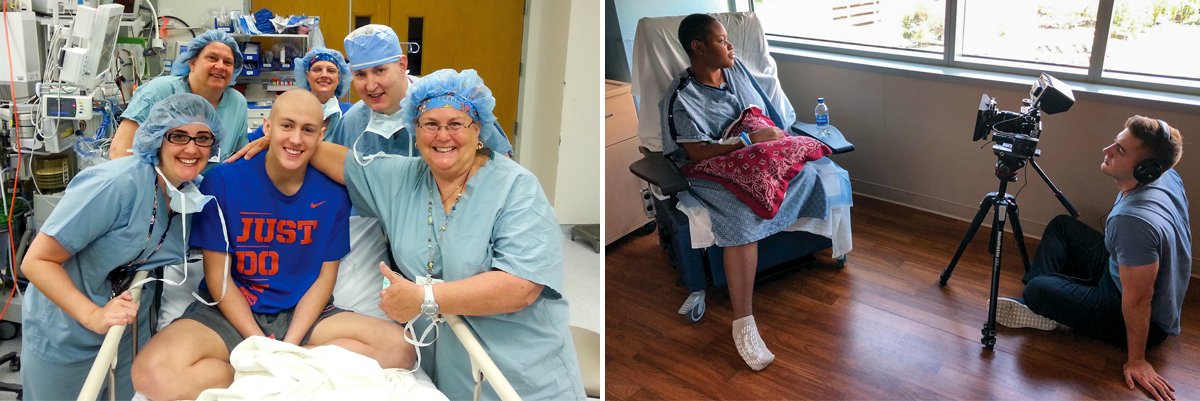 HHP - Update me in site_config > General Configuration
HHP - Update me in site_config > General Configuration

As a cancer survivor and a witness to the struggles of others his age, HHP student Francisco Marchi was moved to tell the stories of young, palliative-care patients — to honor and highlight what matters most to them and their loved ones. His nonprofit foundation creates short films where the patient can be at the center of their own heroic tale.
Francisco Marchi was just 19-years-old when he was diagnosed with diffuse large B-cell lymphoma in 2015. After a long and grueling treatment period facing the most common type of non-Hodgkin’s lymphoma, the senior APK major emerged victorious in his battle with blood cancer.
“That whole process was what sparked my curiosity,” Marchi said. “I knew immediately that I wanted to get into medical research; I wanted to learn more about what made me sick.”
After entering remission, Marchi traveled to Boston where he began studying the very same disease that had left him bedridden for over a year. He became a research fellow at Harvard Medical School, fulfilling his lifelong goal to become a medical researcher before finishing his undergraduate studies. But his desire to work in a lab began to fade after having another close encounter with cancer, this time from a much different perspective.
In 2018, Marchi observed his most memorable patient in a clinical setting: his mirror image in age who was battling a similarly aggressive blood cancer. He was introduced to Megan Kardatzke while studying the same disease that she was diagnosed with.
“I still remember her like it was yesterday,” Marchi said. “There was certain energy about her, she could captivate an entire room.”
A talented model, frequent gamer and aspiring anesthesiologist, Kardatzke battled acute myeloid leukemia (AML) at just 22-years-old. The Jacksonville native was nearing the end of her battle with AML when Marchi had the idea to do the unthinkable, he picked up a camera.
“After going through the motions with research, I knew it wasn’t for me. I wanted to be involved in something that would take me closer to patients,” Marchi said. “That’s when I knew that telling their stories on camera, making sure that they would never be forgotten; that would be the best thing that I could do.”
Marchi had no prior experience with photography, but he followed instructional YouTube videos to learn how to shoot photos, edit video and capture Kardatzke’s experience with AML treatment. Following the insistence of Kardatzke’s mother and Kardatzke herself, Marchi captured her final days.
“When I first saw her near the end of her life, I told myself that maybe filming her wasn’t the way to go based on her appearance, even if she was willing to tell her story,” said Marchi. “But after I talked with her mom and saw how much that this project meant to her, I realized that what something as simple as a video could do.”
Her smile. Her laugh. Her unique energy and spirit. These were all memorialized on film for her close family to enjoy. While Kardatzke did lose her battle with cancer, Marchi said that her inspiring story motivated him to expand his project into something more.
“I still think about her everyday,” said Marchi “After shooting her video, I knew that this is where I needed to be.”
Kardatzke’s video story marked the birth of Marchi’s personal filmmaking project and foundation, Heroes of Medicine (HOM). Since 2019, Marchi has recorded 10 patient videos, four from Massachusetts General Hospital and six from UF Health Shands. Five of his patient videos, in addition to four contemporary medical topic discussions with health care physicians, can be found on the foundation’s website (heroesofmedicine.org).
Named for the tremendous courage and resilience displayed by its participants, HOM is an effort made entirely for pediatric patients, not the public. Most patients are eager to participate once they learn about the opportunity, he said.
“The entire experience is for them. Speaking from experience, once you’re in a hospital ward, you often feel alone, forgotten,” Marchi said. “You get to feel like a movie star for a few hours, it’s a distraction that feels really meaningful.”
Marchi’s videos are entirely patient directed. Patients request that Marchi record a variety of subjects including family time, laughter and sometimes a personal interview discussing their experience with the disease that put them in the hospital.
According to Marchi, he chooses to interview teens and kids because of their shared connection. He enjoys filming ‘those who didn’t have a life yet’ because they remind him of the resilience and bravery he saw from fellow patients during his own treatment.
Once their video is completed, patients are given the option to have their video remain private for family only or release it to the public. Marchi said the sense of meaning and fulfillment provided by the videos motivates many patients to share their film with the public.

(Left) Francisco Marchi smiles with his cancer care team. He was first diagnosed with diffuse large B-cell lymphoma in 2015. (Right) Marchi interviewing a patient — he has since posted five patient videos on heroesofmedicine.org.
“This environment being a sad one is a misconception, it’s a meaningful one,” said Marchi. “When patients watch their video after being filmed, they’re not seeing their disease, they’re seeing themselves as an actor in their own personal movie. It’s a powerful transformation.”
Marchi runs HOM alone, performing all camera work and patient interviews himself. The project partners with volunteers from UF’s Streetlight program to identify patients who would be willing to share their stories.
Unlike other hospital video projects, Marchi does not film patients as a stranger. Instead, he builds a relationship with his interview subjects before asking if they would be willing to be on camera.
“I love being able to learn more about patients and finding out what makes them ‘them,’” Marchi said. “Really connecting and starting a friendship helps you understand more about their experience, even before you get behind the camera.”
This past summer, Marchi secured 501(c)(3) status for Heroes of Medicine, making the project its own official nonprofit foundation. Today, HOM operates as a third-party entity within Shands Hospital, meeting guidelines for ethical filming set by the hospital under HIPAA.
At UF following a successful transfer from Santa Fe College, Marchi plans to balance HOM with his classwork and aims to release a new video every month.
Keeping in line with his love for direct patient interaction, Marchi plans to launch the College of Journalism and Communications’ first doctoral program in science communication next fall. His long-term goal is to pursue HOM full-time after finding a steady source of donations for the foundation.
But the exercise science senior hopes that as his foundation expands, it will be able to help others learn and grow from featured experiences.
“I hope that they reflect – reflect on the strength and sacrifice shown by these amazing people,” Marchi said. “These videos are a look not only into the human condition, but a look into the soul of a hero.”
read more >>